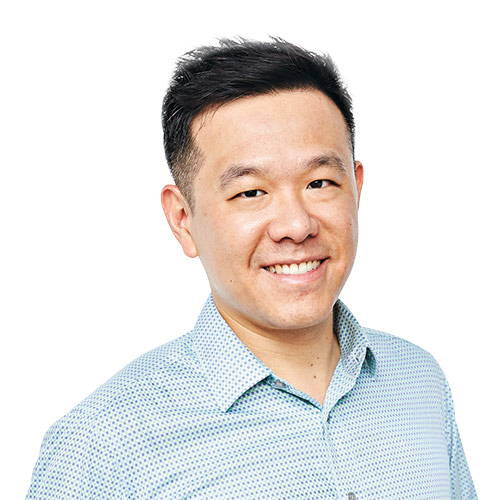Surviving the Corporate Jungle: What Does it Take?
Five NUS alumni in different stages of their career share their insights on the rat-race, navigating office politics, the importance of work-life balance and more.
Labour Pains
When it comes to affluence, Singaporeans are firmly entrenched in the First World, but how evolved are we when it comes to our corporate culture? What are the strategies for getting ahead at work these days — and do the old rules still apply?
OUR PANEL

Mr Tai Xu Hong
(Engineering ’10)
35, Business Development in a start-up social enterprise

Ms Hai Pham
(Public Policy ’10)
Senior Policy Specialist at Google

Mr Lionel Leo
(Law ’07)
37, Partner, WongPartnership LLP

Mr Galven Tan
(Design and Environment ’04)
40, Executive director at an international property consultancy

Ms Jolin Chen
(Law ’17)
25, Legal counsel for an MNC
How far do degrees get us in the workplace?
Xu Hong: I have spent most of my time in start-ups doing work unrelated to my field of study. However, my time at NUS did teach me how to approach matters and break down problems.
Galven: The degree was important when I started out, as it was a requirement at that point and the company only hired Real Estate graduates. However, our company has grown extensively in terms of product lines, so when we run graduate trainee programmes now, we get applicants from across universities and faculties. While the easiest way to get a real estate license is to be a Real Estate graduate, the specialised degree only offers a slight advantage these days.
Lionel: For the legal industry, grades are seeing a resurgence in their importance. Book smarts used to matter less because there used to be an under-supply of graduates. Once you got yourself into a firm, you would have to rely on other skills to prove that you are a good lawyer, especially in litigation. You could be smart but awkward and not have the confidence to stand up and speak in front of the judge or even instil confidence in your client, and the lack of lawyers then would generally still allow you to find a role somewhere. However, these days there is a larger supply of Law graduates so grades have become more important in terms of helping graduates differentiate themselves from others.
Jolin: I was one of those who got a Second Lower, and only landed a job after sending out 66 applications! As a millennial who didn’t do well in school, I knew I had to bump up my street smarts. Now, a year into my job, my employers have stopped looking at my grades and instead assess me by my work skills, such as how I deal with a diverse range of clients.
We often hear of companies where the bosses favour those from certain universities. Have you observed such practices?
What I do know is that there is nothing that I can do in isolation, so it is important to maintain good working relations with everybody.
Ms Hai Pham
Lionel: Recruiters sometimes have their own biases, but such biases can work both ways. For instance, a recruiter might actually favour applicants from more humble backgrounds as he feels that they are more down-to-earth and willing to fight so this bias may level the playing field somewhat. In our firm — where there is an emphasis on diversity — we assess each individual based on his or her merits and abilities, so factors like the alma mater don’t really factor into the decision-making.
Galven: This is probably more common in industries where the companies tend to be smaller in scale. In a larger organisation where there are many roles to fill, a company cannot afford to hire within their “circle” based on the bosses’ own background.
Hai Pham: Google is very unique in that we have a policy on diversity, and discrimination is greatly frowned upon. The company will of course look at your educational background and work experience — those are what will get you through the front door — but once you are in, what matters are your work performance and how well you work with others.

How important is managing relations with your co-workers?
Hai Pham: You never know who you might be working with in the next project, or who you might have to call upon for a favour. What I do know is that there is nothing that I can do in isolation, so it is important to maintain good working relations with everybody.
Xu Hong: The ability to connect with people does matter, and when I hire these days, I find it difficult to find youths who want to connect sincerely and authentically.
Jolin: I bring my whole self to work and am very open. This is especially important because I want people to be comfortable about coming to me with their questions and problems, knowing that I will not judge them. If they don’t dare to come to me and end up doing something non-compliant, that would be worse! We need each other at work and so it is important to keep that human connection.
Lionel: Being genuine and sincere is important, be it in dealing with associates, colleagues or clients. However, while my associates and I often connect over drinks after a case, there is still a need to set boundaries. You can’t be friends with everybody — and I learnt that the hard way. Friends expect to be treated a certain way and might take things personally when being reprimanded.
Are there some kinds of work experience that are more valuable than others (e.g. an overseas stint)?
Galven: You can classify experience into two big categories: those specific to your job, and general experiences that shape you as a person. For example, real estate is a localised business, so how would my 15 years’ experience in Singapore be relevant if I want to go to China? This is when the soft skills that moulded you come into play. A diverse experience makes you more rounded and teaches you to approach things in different ways.
Jolin: It is all about how you frame your experience. I personally regard bad experiences as the best opportunities for personal growth.
Lionel: Yes, you have to know how to frame your work and life experiences to showcase something about yourself. Say, if you took a year off to go skiing – depending on how you frame it, you could be seen as a bum, or somebody who is super passionate.
 TOIL TALES
TOIL TALES
2,345.2 - The average number of hours worked per year by Singapore residents, according to a 2017 Ministry of Manpower report — more than people in all the other Organisation for Economic Co-operation and Development (OECD) countries.
A 2019 study by OCBC bank found that 45% of Singaporean millennials would consider freelancing in the gig economy.
Is it important to trumpet your achievements/draw attention to yourself in order to get ahead? Or can your work speak for itself?
We have to curb our natural biases, because toxic offices are often managed by bosses who allow themselves to be swayed by staff who try to cosy up to them.
Mr Lionel Leo
Jolin: As a member of the Lean In Singapore Chapter and Women in Law Singapore, I observe that many women in the legal industry do not dare step up to be seen. Some might be extremely talented but because they are so humble they get passed up. However, it is not anybody’s responsibility to pick you up as a diamond in the rough. You don’t have to brag or fight for opportunities, you just need to step up to take bigger challenges.
Galven: You can put up your hand or let your job do the talking – it is about how you want to approach your career. However, in a large organisation, if you don’t ask, you don’t get. I’ve noticed that certain expats tend to be more aggressive in voicing what they want to do or what they think they deserve. And to be honest, some employers manage so many people that it helps to speak up for yourself.
Hai Pham: In every job, you have to sell yourself to a certain extent but it is about what your objective is. At Google, it is unnecessary to do that to get recognition, but it is okay to highlight your achievements for the purpose of getting the next big project. I have noticed that some of our foreign colleagues might put themselves out as a project lead rather than just a team member. It is not about them being arrogant but how to brand and speak for themselves. So I learnt from them that my little contributions matter too.
Jolin: I have a colleague from India who was already managing her own team at age 25. I learnt from her how to position how I want to be seen, how to frame my case for a pay raise and the route to take to get it. This has helped me with my own negotiation skills and I now know how to position myself to recruiters.
Lionel: Singaporeans are not so comfortable talking about our achievements, but it makes a difference. That said, humility is still very much valued. Some bosses might feel like you are undermining their abilities to evaluate their team member if you say that you deserve a raise or ask to take on a high-profile project. I think it is okay to present your case, but with humility, and not as an ambitious backstabber!
Xu Hong: The world is overloaded with information – so much so that it is easy to not get noticed unless you speak up. In my case I might trumpet past achievements, but it is with the intention of building credibility and getting a deal. Yet there are many people out there talking a lot about their achievements and not delivering. You need to know how high to raise your hand, and know your own limits in terms of what you can deliver.
Ethics at work — what happens when push comes to shove? Is doing the ‘right thing’ always the best decision in the corporate world?
Xu Hong: Business is cut-throat, and you’ve got to go for the kill. If I happen to know another company’s bid, I would work it to my advantage. But I wouldn’t try to get a deal by downplaying a competitor’s abilities or credibility.
Galven: Paying for confidential information is a clear no. But in business, you get all sorts of information through official and unofficial feedback all the time. If you run your operations professionally, you will be able to make a judgment call on how to use this information responsibly – and also consider the potential consequences that arise from it.
Hai Pham: I chose not to go into tobacco or arms companies so that I would not put myself in a situation where my work challenges my ethical values.
What is your view on office politics and how do you deal with it?
Jolin: I have my personal rules. The first is that the only thing I can control is myself. The second is to always protect myself against attacks. The third is to attack the problem and not the person. The fourth is to set boundaries and not retaliate.
Galven: I don’t think politics is healthy for any organisation, but it is everywhere and knowing how to maintain objectivity and not take sides is critical.
Xu Hong: We fired a person who was stirring office politics despite being given warnings to stop. As management, you have to take a hard stand against office politics – otherwise it will spread like cancer and swing the business off-course.
Lionel: If you are at the lower level, there is very little you can control. The main thing is to not badmouth anybody because it poisons the relationship – and will always come back to bite you. If you are a boss, maintain fairness and promote by results, then nobody would need to play the game. Personally, I am wary of not favouring anybody, regardless of whether I play golf or drink kopi with them. There is a distinction between liking you as a person and how I evaluate you as a staff. We have to curb our natural biases, because toxic offices are often managed by bosses who allow themselves to be swayed by staff who try to cosy up to them.
Managing workplace stress — what is your strategy?
Lionel: My dad taught me that there are only two types of problems: those you can solve and those you can’t fix. If you can’t fix it, move on. I am very carefree because of this. If I can’t meet a deadline despite giving my best shot, I would say so. Worrying about it won’t help me meet an unrealistic deadline, so my workload does not stress me out. Also, I find my work challenging and fun, and I am happy with my work environment – I respect my bosses and like my colleagues. All these help me to cope with the demands of work. Another strategy is to be very compartmentalised. If I am on holiday, I set half an hour before the day starts to look at work mail. And then I switch to ‘husband mode’ and don’t think about work.
Jolin: You have to know your own life priorities. I tried litigation for six months and lost 8kg! So I decided to become an in-house legal counsel. I have a very demanding social life and it is something that I want to enjoy – having something to look forward to outside of work is important to me.
Xu Hong: My philosophy is to be the best of yourself and be happy with it. If it is your choice to check your emails outside of work, then don’t be unhappy about it. Know the challenges of the career that you choose, and come to terms with them. I find that the younger generation are easily stressed because they seek professional growth but also demand work-life balance – but there are points in one’s career where you need to be stretched in order to grow. It is not realistic to want it all, but then be unwilling to put in the effort.
Lionel: As part of a generation privileged to choose the life we want, I accept that many young people don’t want the stresses of being a lawyer in a top-tier firm. It doesn’t give them the satisfaction that the job gives me and so I see more millennials leaving the profession earlier. I feel that if you want the prestige of being a lawyer in a big firm, then you have to put in the sacrifices, at least in the short term. If you improve every day, you will do your work more efficiently and you will eventually have better work-life balance. It is important to be realistic about your expectations.
Jolin: I am a millennial and from my perspective, it is not that we are quitting early. Rather, it is not a life we want. Some of my friends work until 3 to 4am every day, many of them have lost relationships, some have been told that they can forget about becoming a mother. Some of them stay in their jobs because they do not want to settle for a lower pay, but this is not a struggle I want. There are also many other options for us, such as joining start-ups.
Galven: The younger generation has different expectations: they want the perks of corporate life but also work-life balance. I wouldn’t necessarily give any advice to them – hopefully they will observe the work environment they are in and mould themselves to be more adaptive.
If you’d like to join our Forum panel, do write to us at OARconnect@nus.edu.sg to express your interest and pick from our list of future discussion topics that you may want to be part of.
Text By Koh Yuen Lin. Photos By Mark Lee.